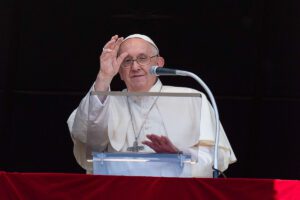VATICAN CITY (CNS) – Jesus says to have no fear of ridicule, persecution or criticism for being faithful to the Gospel, but to be afraid of wasting one’s life chasing after trivial things, Pope Francis said.
“There is a cost to remaining faithful to what counts. The cost is going against the tide, the cost is freeing oneself from being conditioned by popular opinion, the cost is being separated from those who ‘follow the current,'” he said.
“What matters is not to throw away the greatest good: life. This is the only thing that should frighten us,” the pope said before praying the Angelus with some 20,000 visitors gathered in St. Peter’s Square June 25.

In his talk, Pope Francis reflected on the day’s Gospel reading (Mt 10:26-33) in which Jesus tells his disciples to “not be afraid of those who kill the body but cannot kill the soul; rather, be afraid of the one who can destroy both soul and body in Gehenna.”
The pope said the valley of Gehenna was used by the inhabitants of Jerusalem as a large garbage dump. Jesus used this image, the pope said, “in order to say that the true fear we should have is that of throwing away one’s own life.”
Jesus was telling the disciples that they do not need to be afraid of “suffering misunderstanding and criticism, of losing prestige and economic advantages to remain faithful to the Gospel, no, but of wasting your existence in the pursuit of trivial things that do not fill life with meaning,” the pope said.
Jesus had already spoken about the persecutions the disciples would undergo for being faithful to the Gospel, “a fact that is still a reality,” he said.
“It seems paradoxical: the proclamation of the kingdom of God is a message of peace and justice, founded on fraternal charity and on forgiveness, and yet it meets with opposition, violence, persecution,” he said.
“Jesus, however, says not to fear, not because everything will be alright in the world, no, but because we are precious to his Father and nothing that is good will be lost,” he said.
This requires renouncing “the idols of efficiency and consumerism,” he said, “so as not to get lost in things that end up getting thrown out, as they threw things out in Gehenna back then.”
It also means renouncing chasing after things and achievements instead of dedicating oneself to people and relationships, the pope said.
Some examples, he said, include: parents who know they “cannot live for work alone,” but also “need enough time to be with their children”; priests and religious who dedicate themselves to service without “forgetting to dedicate time to be with Jesus”; and young people who are busy with “school, sports, various interests, cell phones and social networks, but who need to meet people and achieve great dreams, without losing time on passing things that do not leave their mark.”
Pope Francis said the faithful should reflect on what they fear and consider the danger of “not pleasing the Lord and not putting his Gospel in first place” and pray to be “wise and courageous in the choices we make.”
After reciting the Angelus, Pope Francis prayed for the families and victims of violence in a women’s penitentiary in Támara, Honduras.
Reports said gang violence in the prison left 46 women dead June 20. One group of female prisoners, armed with guns and machetes, gained access to the cell blocks of their rivals, news reports said.
Some of the women, who were locked in their cells, were burned to death and attacked with gunfire and the machetes, reports said.
The pope said he was “very saddened” by the “terrible violence between rival gangs,” which caused death and suffering.
“I pray for the deceased; I pray for their families. May the Virgin of Suyapa, mother of Honduras, help hearts to open to reconciliation and to creating space for fraternal co-existence, even within prisons.”

